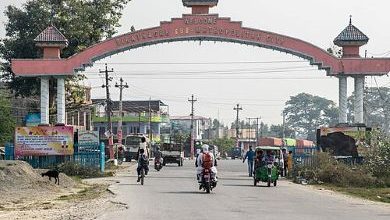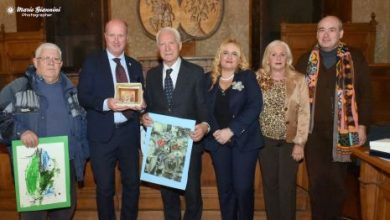Disastrous September – A Novel on 9/11 Terrorist Attacks Part-8

In memory of the 2981 victims of the September 11, 2001 terrorist attacks on the World Trade Center, among them three Albanians: Frrok Camaj, Mon Gjonbalaj and Simon Dedvukaj
[Disastrous September, by the Albanian-American author, Skifter Këlliçi, takes place on two different days: May 10 and September 11, 2001. The novel tells the story of a well-known CNN reporter named Steve Ferguson, engaged to Jacqueline Cramer, a flight attendant based at Logan International Airport in Boston, Massachusetts. In addition, the novel explores the lives of four Albanians. Besim Istrefi, Rrok Camaj, and Marko Muzaka worked as window washers in the Twin Towers. Sokol Kama, a journalist and writer, works in security at Logan International Airport. On September 11, 2001 just a few days before Steve and Jacqueline’s wedding, two planes, bound for Los Angeles, depart from Boston. Terrorists hijack them and crash them into the Twin Towers in New York. The author, who worked at Logan International Airport during the attacks, offers a gripping account of the tragedy and shows how it could have been avoided.]
By SKIFTER KELLICI
[Translated from the Albanian by Carrie Hooper]
“I was dancing with Fatie. We were laughing because she had grown up under the Taliban in the mountains of Afghanistan and had never seen a modern dance. She didn’t know how to dance. We were wearing bright colored clothes and were dancing in the middle of the floor until you and Steve joined us. You were so in love and couldn’t take your eyes off each other. You didn’t realize everybody had practically left you alone on the dance floor. You danced beautifully, like one person. The song played several times.”
Jacqueline sang:
“Come back in September, the month we met,
So I can hold your hand
While we kiss under the tree,
And lay on the green grass.
Nothing but the dawn can separate us.”
“You kissed each other,” Sokol recalled. “We looked at you and shouted, ‘Long live the lovers!”
Jacqueline covered her face with her hands and said, “No wonder you’re a writer, the way you remember everything and describe everything so beautifully.”
Her eyes shone, and she could not stop laughing.
“Steve is a good writer, too,” she said. “He did a really good job writing the documentary about Albanians, and he nailed it with the title, The Eagle Above the Fort.”
She paused for a few seconds then continued, “And the questions he asked, I get emotional every time I think about it. Or maybe I think so highly of him because I love him so much.”
 “To be sure, he’s a competent journalist. Besim, Marta, and their son gave intelligent answers. The little one expressed his wish to go back to Kosovo and visit the villages where his parents were born and raised. You’re right, Jacqueline. Steve’s documentary was spot on. Well, your flight will probably be leaving soon.”
“To be sure, he’s a competent journalist. Besim, Marta, and their son gave intelligent answers. The little one expressed his wish to go back to Kosovo and visit the villages where his parents were born and raised. You’re right, Jacqueline. Steve’s documentary was spot on. Well, your flight will probably be leaving soon.”
“Yes, it will,” said Jacqueline.
She and Sokol stood up at the same time. As she was leaving the restaurant, she saw the members of her crew.
“Thank goodness you remembered to join us,” said Emma Jackson, another flight attendant. “Sokol was probably telling you stories about a new book. If you had been delayed any longer, we would have left you here.”
“Then she would have flown to New York to see Steve,” said Chris Frasier, a pilot who had been working for American Airlines for many years.
“We wouldn’t have left without you,” said Patrick Estrom, another pilot. “Especially not today, your last day with us. Your sense of humor makes you the heart of our crew.”
“We plan to ask the passengers to raise a toast to the bride to be,” said Chris.
“How wonderful!” cried Emma.
“I’m speechless,” said Jacqueline. “I don’t know what to say except thank you from the bottom of my heart!”
As Sokol was going back to work, he saw Jay Clement. He had only seen him a couple of times since their conversation in May, when he had suggested a few changes in protocol. Jay had not responded to Sokol’s proposals and had not discussed them anymore. He nodded as he passed by.
“How strange,” Sokol thought. “Didn’t Jay tell his superiors about these problems? Or doesn’t he think they’re important?”
The passengers moved slowly toward the area where they would empty their pockets and put their belongings in small plastic bins to be scanned. With every beep, the workers checked the item in question. After an older man and his wife went through security without any difficulty, the man smiled and asked, “Do you remember me?”
Sokol looked at him and said, “I’m sorry. I see thousands of faces every day and it’s hard to remember everyone.”
“I’m George Bradley. Last spring, you told me to take off my belt. This time, I made sure to take it off and put everything that can trigger a beep in these bins.”
At once, Sokol remembered him. He had been surprised when Sokol had asked him to take off his belt.
“I’m grateful you take precautions to ensure our safety,” George continued.
“Thank you, sir. I wish more people would be as understanding as you are.”
After the elderly couple left, Sokol saw a young man in his early twenties, dressed in a blue shirt, with short, black hair. It was Muhammad. He put his suitcase on the conveyor belt and took some coins as well as a small knife out of his pocket. He smiled as he waited for his luggage. Sokol measured the knife. Its size conformed to FAA regulations, but it was sharper than other knives he had seen.
“Is something wrong?” asked Muhammad.
From his accent, Sokol knew the man came from an Arab country.
“No, Sir, everything is fine. You may proceed. However, I noticed your little knife is quite sharp.”
“I like to fish,” said Muhammad. “I use the knife to clean and cook the fish I catch.”
“That’s what I thought,” said Jacqueline, who stood behind Sokol. Sokol was still suspicious. He saw Gary sitting in the restaurant and considered asking his opinion about the knife, which looked even sharper in the light, but he figured he would ignore him. Therefore, he said, “You’re good to go, Sir.”
After the man left, Jacqueline went through security, and Sokol scanned her bag.
“I’ll see you at our wedding,” said Jacqueline. “We decided to go to Albania for our honeymoon. We’re going to Saranda because Besim described it so beautifully.”
She said good-bye to Sokol and Fatie.
“I’ll see you soon,” she said.
“You bet,” said Fatie, “but before you go, we have something for you.”
The other passengers had overheard Jacqueline’s and Fatie’s conversation and wanted to find out what was going on. Suddenly, they heard a beautiful song:
“We wish you and your beloved Steve
A happy marriage.
May you always be blessed!”
 Jacqueline stood there, stunned while other people looked at her, among them, two security employees, a thin, young girl from Indonesia, who worked in maintenance, a man in his forties from Bangladesh who worked in a coffee shop, and a few other American Airlines employees, who worked in Terminal B. All at once, a young girl from Morocco pulled a bouquet of roses and a box from behind her back.
Jacqueline stood there, stunned while other people looked at her, among them, two security employees, a thin, young girl from Indonesia, who worked in maintenance, a man in his forties from Bangladesh who worked in a coffee shop, and a few other American Airlines employees, who worked in Terminal B. All at once, a young girl from Morocco pulled a bouquet of roses and a box from behind her back.
Read: Reborn the Heart – Albanian Poetry
“This was Sokol and Fatie’s idea,” she said, hugging Jacqueline and handing her the flowers and the box. Then everyone else hugged her and wished her all the best. She kept looking at Sokol and Fatie, who couldn’t leave their stations.
“Okay, let’s go before she changes her mind,” said Emma.
“She’ll be a hard act to follow,” said Chris.
“We’re gonna miss you,” said Emma.
“Me, too,” said a young girl named Greta Vozinsky. “This is my first flight.”
“You never forget your first flight,” said Jacqueline. “It’s like your first love. It lives in your heart forever.”
Jacqueline looked at the crew which had treated her kindly and thought about the many flights they had worked together. It made her sad to realize this was her last flight with them.
After she boarded the plane, she called Steve.
“Hi, Honey. We’ll be leaving for Los Angeles in about an hour. You’ll never guess what happened.”
“What?”
Jacqueline related the morning’s events.
“If they love you that much, imagine how I feel. I’m crazy about you,” said Steve. “Come and see me as soon as you can. I’m afraid I’ll die if I don’t see you!”
“I feel the same way,” said Jacqueline. “Just two more days and we’ll be together for good.” (Continue)
Click here for Part-1, Part-2, Part-3, Part-4, Part-5, Part-6, Part-7,
_________________
About the Author
 Skifter Kellici -Albanian-American writerSkifter Këllici was born in Tirana, Albania and received a diploma in history and literature from the University of Tirana. He worked as a journalist, scholar, and sportscaster on radio and television. He is the author of several novels and nonfiction books, including the children’s books, “Memories of the Old Neighborhood” and “In the Footsteps” as well as the historical novels, “Assassination in Paris”, “The Murderer with the White Hands”, and “September Disaster.” He wrote the screenplay for “In the Footsteps” which won a special prize at the International Children’s Film Festival in Giffoni, Italy in 1979. He has lived in Boston, Massachusetts since 1999.
Skifter Kellici -Albanian-American writerSkifter Këllici was born in Tirana, Albania and received a diploma in history and literature from the University of Tirana. He worked as a journalist, scholar, and sportscaster on radio and television. He is the author of several novels and nonfiction books, including the children’s books, “Memories of the Old Neighborhood” and “In the Footsteps” as well as the historical novels, “Assassination in Paris”, “The Murderer with the White Hands”, and “September Disaster.” He wrote the screenplay for “In the Footsteps” which won a special prize at the International Children’s Film Festival in Giffoni, Italy in 1979. He has lived in Boston, Massachusetts since 1999.
About the Translator
Carrie Hooper was born and raised in Elmira, New York. She has been blind since birth. She received a B.A. in vocal performance from Mansfield University, Mansfield, Pennsylvania. She went on to receive an M.A. in German and an M.A. in vocal performance from the State University of New York at Buffalo. After completing her studies, she spent a year at the Royal University College of Music in Stockholm, Sweden as a Fulbright scholar. Carrie currently lives in Elmira, New York. She taught German, Italian, and Romanian at Elmira College. She has a passion for foreign languages and in addition to the languages mentioned above, she is also proficient in Swedish, Spanish, and Albanian. Music also plays an important role in Carrie’s life. She teaches voice and piano lessons, gives vocal concerts, plays the piano and organ at a church, and sings in a community chorus. Carrie not only loves music and languages, but also enjoys poetry. She has published three books: “Piktura në fjalë” (“Word Paintings”), a bilingual collection of poetry (Albanian-English), “My Life in My Words”, and “Away from Home.” She has also translated texts from Albanian and Romanian to English.
[The novel is being republished in episodes with the consent of the author]
Read: WAR – A Bouquet of Poems from an Albanian Poet




